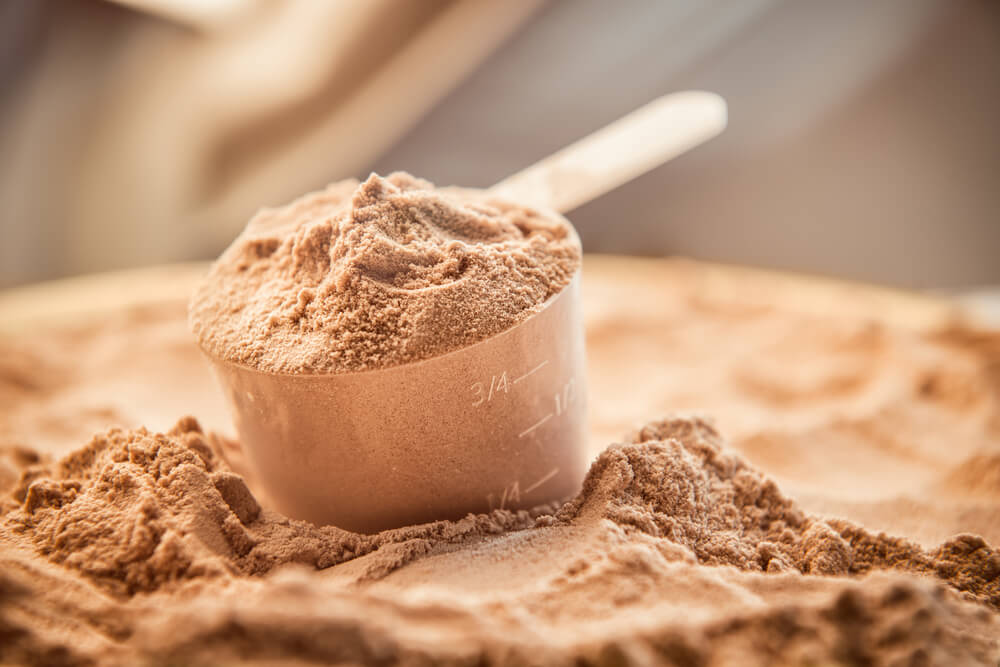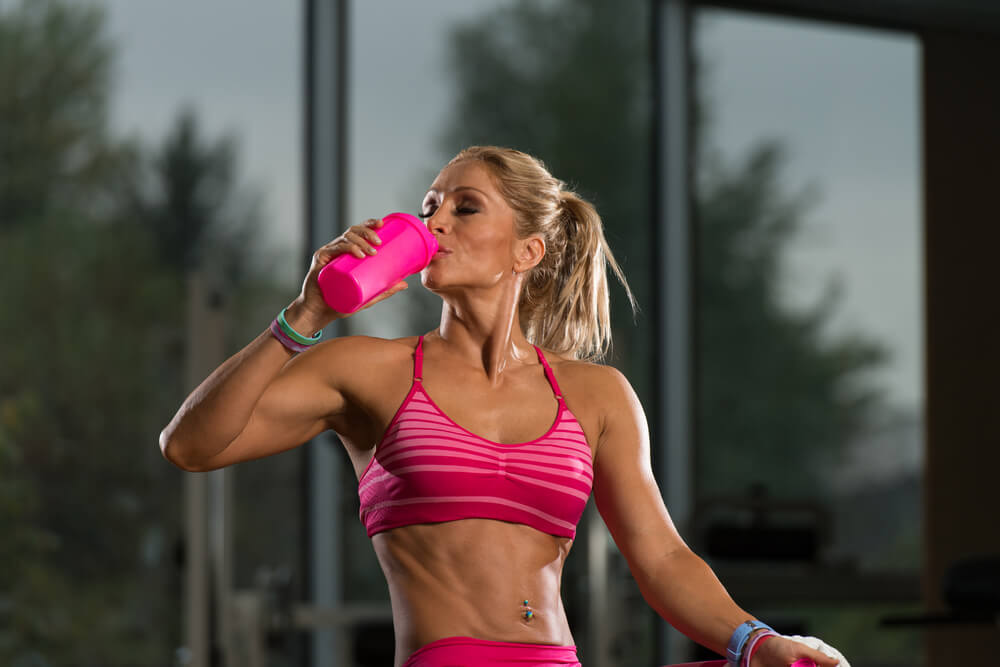
All mixed up on protein powders? We’ve got the facts you need to make a smart choice for your post workout recovery. What’s the best protein powder? Today we’ll find out.
When you think of the best protein powder, what do you think of? Building muscle? Tasting great? Clean production practices? Well, for us, it’s all of the above.
So we’re going to give you the all facts to feed your muscles what they need and get you refueled for your next workout.
You probably already know that protein comes from certain whole foods.
Well protein powder is just like that, except you’re making a drink out of it. If you aren’t getting enough whole foods or protein is lacking in your diet, protein powders are an excellent (and easy) way to add it.
If you want to gain muscle, to reach your 1g per lb. of bodyweight goal, a clean protein supplement is a must.
Plus, with the best protein powder, you get ultra convenience. This means mixing clean, and having a healthy dose of muscle building protein on the go.
There are plenty of misconceptions about protein powder. But to us, and many others, it’s an absolute staple. You don’t need to worry about meal prep, cooking, or food going back. You make a shake and you’re ready to go.
Don’t have time to drink it now?
Throw it in the fridge for later. Plus, the portability… you just can’t beat it. Drink it on your way to the gym or work or whatever. Drink it during your workout if your stomach allows.
No more trying to cut up and eat a chicken breast while driving, right?
The most important way that the best protein powder helps you, is that it’s very difficult and expensive to reach the protein levels you need for muscle growth. Protein supplements help you reach your goals without killing your wallet.
Are you wondering, how much daily protein do I need?
There’s still a lot more you should know about what makes one supplement over another, ‘the best protein powder.’
Best Protein Powder: Getting Started and Getting Fit
First of all, protein powders are considered a dietary supplement. And, needless to say, they contain a lot of protein.
The protein in these supplements can come from a bunch of different food sources and some might even surprise you. We’ve got your normal protein sources like eggs, milk and rice. Now here are some sources of protein you may not know about.
It might surprise you that protein is even found in things like peas, soy, cranberries, artichokes and hemp.
We’ll take a look at some of the best protein powder options and help you decide what’s right for your body. A lot of this depends on your goals, and if you’re willing to spend a little extra for super clean processed proteins.
On top of protein, a lot of manufacturers bulk up their individual products with things like minerals, greens, vitamins, fiber, and grains.
If you’re wondering how to supercharge your protein shakes, feel free to get creative! A blender is one of the best pieces of gym equipment in our opinion.
Other types of products have things like carbs and fats, since they’re more likely to be considered a meal replacement powder (or MRPs) as opposed to just straight up protein. These can be used to bulk up by adding meals to your day. They can also be used in place of solid foods if you’re trying to lose weight.
Also, you might be wondering how to choose the best protein supplement for women. This too comes down to your weight loss and fitness goals.
Just about all protein powders are considered to be an extremely processed food supplement. After all, they kind of have to be. There’s a lot of pressure on them – they need to have a pretty decent shelf life and not taste like crap. So, quality comes down to process. This is one of the main concerns we took into account in developing our own super clean Gym Junkies Protein.
How Are The Best Protein Powders Made?
So protein powders definitely come from whole food sources…. but they aren’t exactly whole food in themselves. Confused?
Don’t worry, we’ll explain.
Basically, protein powders are created by taking the protein part of the food out. There are a lot of different processes and methods to this.
You might have guessed that depending on the source of protein, it may have a different processing technique. For example, how do you think manufacturers are able to get rice protein from something as sticky and dense as rice? Takes a magic touch, we guess.
One popular method is concentrating the product.
Concentration involves a high, dry heat process. Then, acid extraction comes into play. These two combined weaken the source of whole food and BAM! It’s made into a concentrated protein powder. Just like that. And despite that intense process, it’s still pretty affordable.
And it isn’t just protein that gets concentrated here. There can be other things with the protein, like fat, lactose or even cholesterol.
Going by weight, these concentrates are usually in the ballpark of 60 to 70% protein.
Another commonly used practice is isolating the protein. Whey isolate is among the post popular forms and often considered the best protein powder.
The whole theory behind this idea is to get most of the protein separated from the actual food. Kind of hard to wrap your mind around, isn’t it? Well, companies manage to do this by 1 of 3 ways: a water wash, an alcohol wash, or a specific ionization technique.
Because all three of these methods are different, there’s a different cost associated with each one. You probably saw that coming.
Which do you think is the least expensive?
The water wash is definitely the least expensive…with the ionization being the most expensive. Since ionization is the most expensive, let’s take a look at that first.
Right after the isolate is made, it then goes through an enter filtering process. During this time, basically everything but the protein will be donezo. Anything that’s left – things like carbs, fat, or fiber – will be minimal and barley noticeable.
Remember how we said that concentrates are about 60-70% protein by weight? Well with isolated proteins, that number gets bumped up a little bit. It goes all the way up to 90-95%!
Another type of method used often is hydrolyzing the protein. This is when water is added to the protein polymers.
What does this do?
This breaks everything down into mini groups, which are then called peptides. This groups can be vary in size, from 2 to 5 amino acids. And this whole process is done in order to encourage and increase absorption. Basically, hydrolysis is getting a jump start on digestion. This whole process is expensive…. so it’s going to be pretty pricey in the store, too.
Let’s get a little science-y for a second.
Remember learning about ions and atoms and stuff in science class? Yeah, don’t worry, we don’t remember it all either.
We’ll help you out. Now ions are either atoms or molecules that have charge-bearing groups.
When you start with ion exchanging, that separates the protein molecules from other components in the food. And it’s done by using those electrical charges. Though this sounds pretty complicated, it’s not. In fact, it’s used on a daily basis because this same process is used for making milk.
Finally, the last process is a filtration process. This can be anything from ultrafiltration to cross filtration to micro-filtration. What this process does is it strips away the contaminants of the protein by passing it through a membrane. And just like that, you’ve got it! This is an excellent, though potentially a bit expensive, way of getting your protein powder.
This filtration process is the cleanest in our opinion and the reason why we chose this as our method for creating our own easily digestible, high potency and fairly priced Gym Junkies Build.
So How Do You Choose the Best Protein Powder?
Here’s why you should think about protein powders. Whether you’re trying to lose weight, maintain your current weight, or gain weight, we all have one thing in common – we need enough protein in our diets. Protein has so many health benefits – it helps you with your weight and overall body composition, not to mention how it encourages your muscles to grow and boosts your immune system and the way you recover from exercise.
Want to know how to make the ultimate post-workout shake? Better believe you need the best protein powder to make it happen!
So yeah, you absolutely need to get enough protein, especially if you aren’t already getting enough from your diet and other whole foods, which can be extremely expensive.
REMEMBER: Even the most expensive protein powder is still cheaper than getting the equivalent amount of protein from whole foods.
And let’s face it – it’s a heck of a lot easier to grab a scoop of protein powder in a convenient travel shaker and toss it in your bag than trying to munch on a steak while you’re driving.
Plus, if you’re into smoothies and shakes, do you throw a chicken breast in the blender along with the other ingredients? Probably not. If you do…okay, gross. Maybe stop doing that and focus on a protein powder. It’ll probably (definitely) taste better.
Best Protein Powders by Comparison
Like most things in life, protein powders aren’t perfect. For some, making this decision is as simple as deciding on the best tasting protein supplement. If you want to look a little deeper, we can help with that too.
There’s good and bad to each kind of protein powder. We’ve done a lot of digging and experimenting with our own nutritional regimens to determine the truth about protein powders and what to look for before buying.
Below you’ll find a comparison of each option and an explanation of how they might fit your diet and goals.
Rice Protein
Rice protein is free of gluten and is hypo-allergenic. Plus, it has a pretty mellow taste and comes completely 100% from plants – but it may come from genetically modified rice.
Egg Protein
Egg protein is pretty great, mostly because it’s fat-free and comes from large (and concentrated) amounts of amino acids you really need. The downside? Some people report having an upset stomach.
Whey Protein
This is derived from milk and includes things like whey, calcium caseinate, and other types of milk protein blends, can give your immunity a boost. Plus, it’s high in BCAAS. But, if you’re a little sensitive to things like lactose or whey, it could upset your stomach. However, a clean whey protein supplement is a staple of many, many fitness enthusiasts.
Pea Protein
Pea protein has no cholesterol or saturated fat at all. Yay! For any vegans reading, this is a great option for you. Plus, it’s easy to digest and hypo-allergenic. Because it’s completely plant-based, it’s extremely high in arginine, glutamine and lysine. No negatives here!
Hemp Protein
Another pretty healthy protein is hemp protein. Much like pea protein, it’s high in arginine and histidine and is 100% made up of plants. Plus, it gives you a good dose of your omega-3 fats!
Soy Protein
has some data proving that it could offer some benefits for anyone suffering from a cardiovascular disease. Now, it may come from genetically modified soy, but it is 100% made up of plants.
Cranberry Protein
Cranberry protein, much like cranberries on their own, has a lot of antioxidants, which remain intact during the processing. And it also has a good amount of omega-3 fats. This one also comes from plants too!
Artichoke Protein
Finally, artichoke protein. A little weird but we’re going with it. For some reason, it’s a good source of a specific prebiotic called inulin and has tons of BCAAs. Since it also comes from plants, you can’t go wrong here.
Protein Powder Quality vs. Quantity
When it comes to protein, they’re usually classified depending on their quality. And that’s determined by one of the following:
The net protein utilization (or NPU) is a little mathematical. It’s basically the ratio of amino acids when they’re changed into proteins vs. the ratio of amino acids that are supplied. Too complicated? Think about it like this – basically, it’s the total amount that food offers to your body (depending on how it digests and what the amino acid make up is).
Protein can also be qualified depending on it’s biological value (or BV). This method measures the amount of protein absorbed from a specific food. Essentially, it’s how well (or not-so-well) the protein can be used to arranging new proteins.
The protein efficiency ratio (or PER) is calculated by the weight gain of the subject at hand (which are usually rats) and the divided by the amount of protein taking in during the test period. So this whole technique helps show that protein is used for growth, not necessarily maintenance.
Finally, protein digestibility corrected amino acid score. This isn’t like a test you had in science. This is actually based around the requirements a young child has for amino acids and is a fairly new method. Like the other methods, it just takes the digestibility of protein into consideration.
Conclusion
Is your head spinning with all this scientific and math stuff? Let’s make it simple. You NEED upwards of a gram of protein per pound of body weight to build muscle. A clean whey protein supplement is our favorite way of reaching our daily goals. If you want to try other options, be our guest! That’s why they exist.
What makes us experts on the best protein powders?
Well, experimenting, practice and years of drinking them to support muscle growth. Frankly, we know what works because we’ve tried them all. We took everything we know about protein and put it to use in our own Gym Junkies Build protein powder.
We know things can get a little blurry when it comes to your health. But take this into consideration – before deciding on a protein powder, ask yourself what you’re looking to accomplish.
When it comes to protein powder, the amount of cash you’re willing to dish out will reflect back on your results. You want to get a protein powder that has a higher quality and isn’t full of fillers or fat. This’ll definitely hinder your results.
Don’t get frustrated if you don’t see results or have an upset stomach right away. A lot of people say rotating around every 2 to 4 weeks can help you fight any intolerances you may build up.
And don’t forget that the best protein powders help you with your recovery. That’s why it’s best to have one within 30 minutes after intense exercise. You might start to feel the effects of this right away. And the faster you recover and build new muscle, the faster you can get out there and keep working towards your goals.
-Terry Asher
Terry
Latest posts by Terry (see all)
- How Important Are Net Carbs For Building Huge Muscle? - Apr 28, 2017
- The Matt Damon Workout Explained - Apr 27, 2017
- Watercress – Benefits And The Best Way To Consume It - Apr 26, 2017















Personally my protein of choice is whey protein, but I didn’t know there was that many different kinds of protein powders in existence. I’ve definitely got to try out the cranberry one sometime, it sounds really good!
Thomas,
I agree I prefer whey myself, and it’s the fastest absorbed as well. It’s nice to know there are others out there especially if your allergic or just don’t like the taste of some ;).
Terry
We’ll have to add Cranberry Protein to our list of preferences.
When I first started using supplements I found the variety of different types of protein (let alone supplements in general) very overwhelming. Not only that, I also found them very expensive – the fact that they finish so quickly didn’t help either. There were a few platforms that gave discounts but, when you’ve finally found the types of supplements and brands that work for you, none of them gave offers tailored to your needs. We’re trying to solve this with an app we’re developing that gives targeted discounts as rewards but we could do with some feedback to make sure it solves this problem for everyone. Please check us out, we’re currently doing a private beta (it’s free too).
http://bodybuildingappbell.co.uk
Hi all!
My name is Susana Barker, I am a housewife. I has a fat body a weakly health, so I want to find a best protein powder which is good for my health.
It’s true that calories in calories out model of thinking has it’s flaws, but if you want to gain muscle mass then it’s important that you take in more (quality) calories than you consume.
Very true and we agree